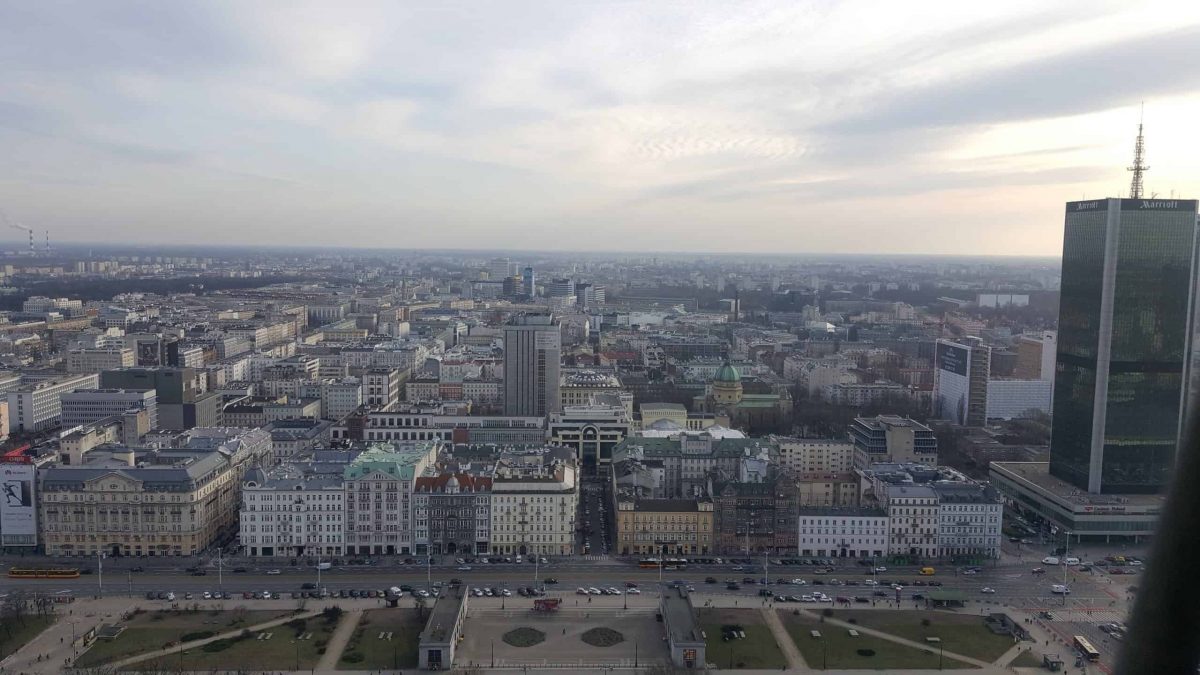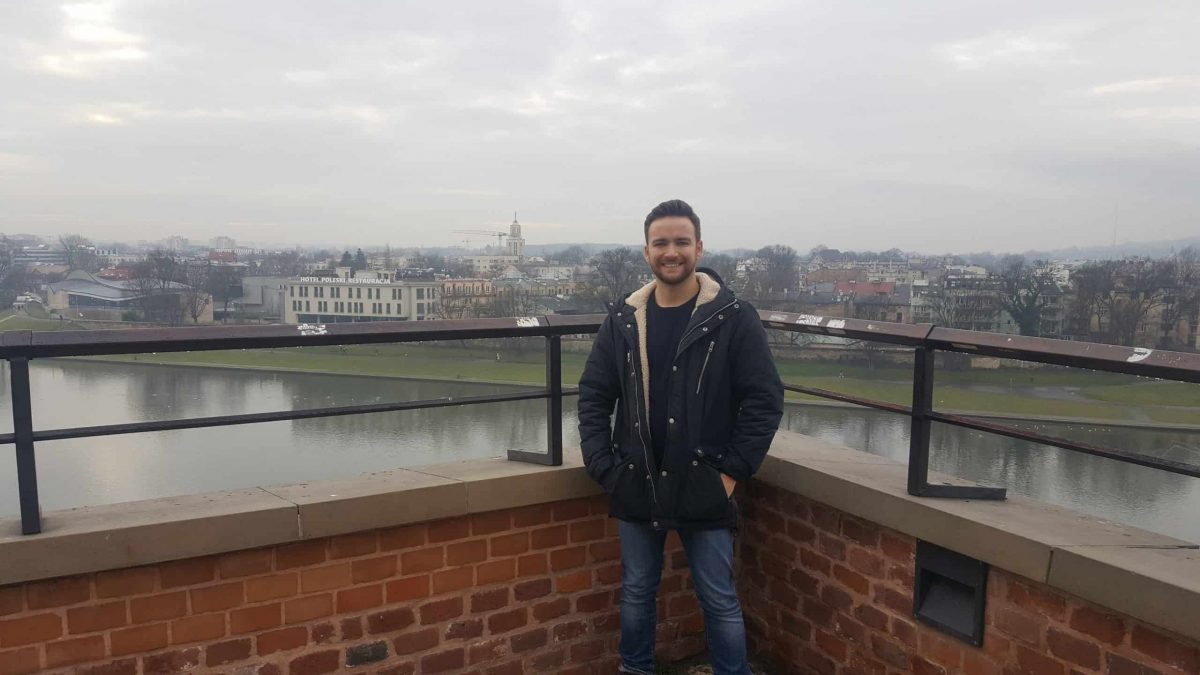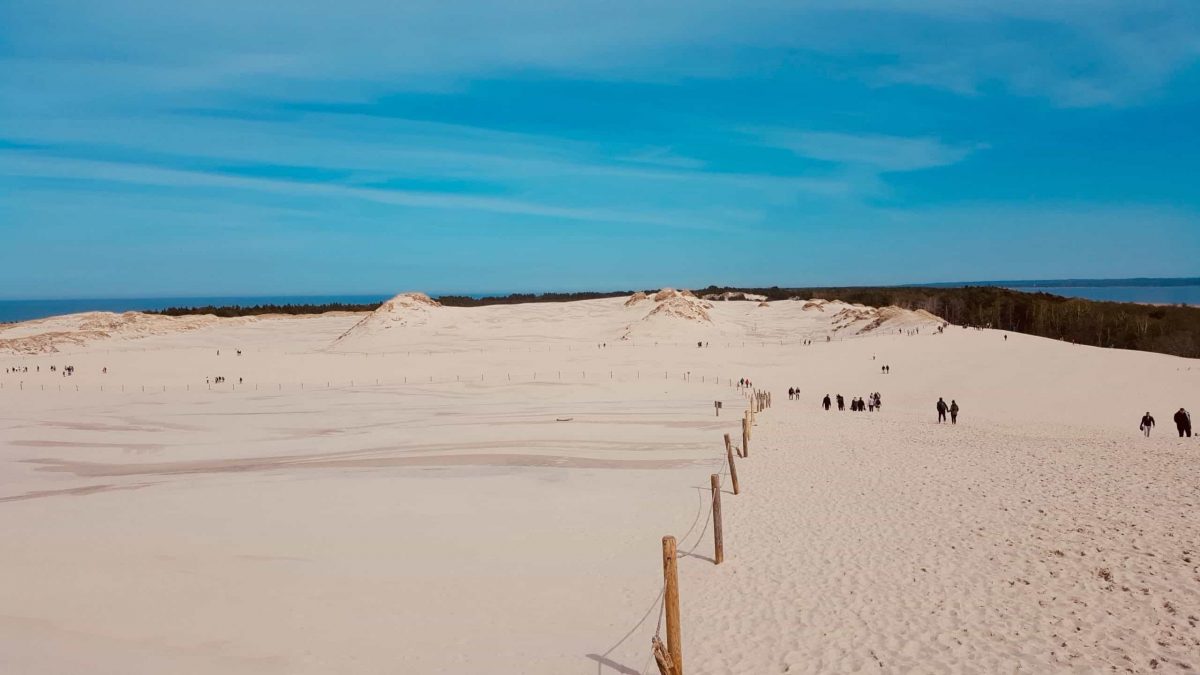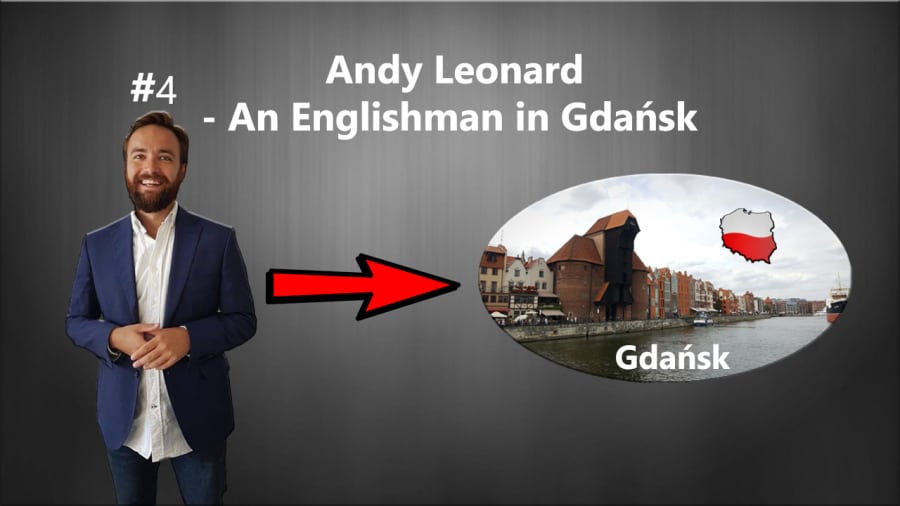It’s been a while since Finding Poland interviewed an expat. This time around we have Andy Leonard – a Native Speaker English teacher in Gdańsk.
Andy is from the Forest of Dean region, in Gloucestershire, UK.
He has lived in several districts in Gdańsk, including Morena, Suchanino and Przymorze. He’s recently moved to a newly renovated flat in a small village called Chwaszczyno, which is around 14km due west of the popular resort of Sopot.
Andy’s been teaching English for six years. After teaching in Malaga, Spain, for two years, Andy moved to Gdańsk. He’s been teaching in “The Capital of Amber” for four years, and has been self-employed for over two years.
I caught up with Andy at Kawiarnia Retro on Gdansk’s stunningly quaint Piwna Street.
Let’s dive in for the best bits from what was an intriguing ninety-minute chat with a very ambitious and interesting Native Speaker English teacher in Gdańsk …
Why Poland, and why Gdańsk?
“ Well, I need to rewind a bit to my student days. It all started when I was studying Spanish at university in Birmingham. I did an Erasmus in Malaga for a year and it was the first time I had proper interaction with Polish people. As I remember it, I was not immune to stereotyping Polish people as strawberry pickers and factory farmers. However, meeting my Polish friends put all those stereotypes to bed. They were very welcoming, humble and hardworking people.
Anyway, my friends invited me to Gdańsk for a New Year’s Eve party around six years ago. I really fell in love with the city and its unbeatable atmosphere. Another element which reeled me in was the fascination I’ve always had with industrial art. Gdańsk, of course, is famous for industrial art and the shipyard industry. I used to do lots of art at school, with a focus on metalwork and rustic elements – industrial art. So I was mad about the shipyard relics at Stocznia shipyard. Perhaps all of this was just a magical piece of fate.
Besides, at that time, I didn’t know what to do with my life. I’d been living in Spain but I didn’t really enjoy it because it never felt like “home”. It just felt like a permanent holiday destination.
So I decided to move to Gdańsk with my friends and make a life for myself.”
Did you settle in Gdańsk quickly?
“I quickly got a job at a school on the outskirts of Gdańsk. It was a decent school with a supportive boss and friendly teachers. I quickly established friendships with some of my colleagues. Eventually, that all fell apart, for reasons I won’t go into right now.
I had a decision to make – to stay in Gdańsk or return to the UK. Of course, I decided to stay. That was four years ago, and the rest is history.
When it comes to expats living in major Polish cities, I realised early on that there are more living in Kraków and Warsaw than in Gdańsk. In a funny way, that was actually quite comforting for me. My aim was to immerse myself in Polish culture. So, apart from one Scottish guy who lives in Gdynia, all my friends are Polish.”
Think back to your first weeks after moving to Poland on a permanent basis. Did you experience culture shock?
“I wouldn’t say I encountered culture shock on a large scale, but there were some things that were very rather peculiar to me.
For instance, the transport system wasn’t up to much. The buses, trams and SKM trains weren’t very punctual and the ticket system was mightily confusing. However, I soon got used to everything.
Ah, Polish driving culture. It quickly dawned on me that there are a lot of crazy drivers here! I think British drivers are much more respectful, particularly when it comes to tailgating. That said, I think that the police here in Poland are starting to get a grip on those who speed.”
I once wrote a piece about some common stereotypes of Poland and Polish people which I felt needed to be invalidated. Could you comment on some perceptions and stereotypes you’ve heard about, and why you think they deserve to be overturned?
“I was particularly drawn to your comments about Warsaw in your article, and how the city’s got a bad rap over the years.
I think that it’s a tragedy what happened to Warsaw. I’ve never really been a history buff but living in Poland has broadened my historical knowledge. It makes me very emotional when I think about what Poland’s been through. And what the elderly generation has been through for that matter …
The average foreigner might jump to the conclusion that elderly people in Poland are grumpy without considering what they’ve been through. They lived through communism, and people in their eighties and nineties may well have vivid memories of the Second World War. I don’t blame them if they’re prone to the odd whinge or spell of grumpiness.
As for Kraków, I can see where you’re coming from in your post. The city is too touristy and polluted for my liking. Wrocław is my second favourite city in Poland, after Gdańsk. Wrocław is quite touristy but it has a specific charm about it with the islands and waterways.”


How do you find Polish food?
“In general, the food here is quite heavy – quite starchy. A lot of potatoes, a lot of farm foods. It’s cheap food – but I love it! Who doesn’t love some traditional Pierogi or Kotlety! I especially love the food that is prepared for Christmas and Easter with an abundance of delicious salads and meats to choose from.
When I visit my friends and their families, they lay on these spreads which are out of this world.
Compared with most British families, Polish families emphasise hospitality as a whole rather than merely the ingredients that go into dishes.”
How’s it been sorting out your residence permits and dealing with all the bureaucracy in Poland?
“I don’t really like to rely on people but I’ve had to rely on my friends to my own advantage here in Poland. It’s necessary to get things done. My friends often remark that they hate going to the Urząd Miejski [city hall]. I tell them that I don’t like asking them to go with me, but it’s necessary because if I want to live here in the future I have to think seriously about these things.
As I moved here and registered my stay before Brexit, I have a different residence permit to British people who moved here after Brexit. So there’s temporary residency, permanent residency and “confirmation of registration” – which I have. It lasts for thirty years but I always feel stressed when I go through passport control. They look at the document I have as if to say “what is this?”. I sometimes wonder whether I’m living here legally!”
In the summer of 2021, I analysed the cost of living in several Polish cities in a write-up for Finding Poland. What’s your take on rental fees, property prices and the cost of living in Poland right now?
“Yes – another one of your posts that’s intrigued me.
When I first moved here, I was living in a shared flat with two guys and we each had to pay around 900zl a month. That was fine for me.
After that, I moved to a flat close to the beach in Przymorze. I paid around 3000 zl for the rent and bills.
Looking at property prices in Poland right now, I have no idea who has the funds to buy a place. I mean, a bedsit for a million zloty! Come on! But that’s Gdańsk for you.
My family thinks that I live in a third-world country and that everything’s really cheap. However, they were quite shocked when they visited and saw the price of clothes in shopping centres. It’s the same when it comes to eating out at a restaurant – prices have really shot up in recent years and are pretty comparable to those you might encounter at restaurants in British cities.
As for other things, I think the costs are quite reasonable to get a sim-card and run a mobile phone in Poland. I currently pay 30zl a month for 10 GB of Internet. However, I have to top it up now and then to make calls and send texts. So I’m looking for a better offer.
I must say that entrance fees to attractions, zoos, and museums are also very reasonable. 25zl per person to enter a top-notch museum – not bad considering that it costs 30 GBP or more in London.
Public transport – I don’t think it’s expensive to get around Gdańsk by bus or tram. Train fares are also very reasonable in Poland.”
Can you tell my readers about some places you’ve visited in Poland which are slightly more off-the-beaten-track?
“Yes, Giżycko, in the Masurian Lake District. Not many foreigners go there.
Nearby Giżycko, my friend has a house in a village called Kruklanki in the centre of the Masurian lake region. Beautiful area – just the landscapes, the lakes, the peacefulness and tranquillity, the kayaking. I’m really into kayaking. I often go kayaking with my friends in Mazury.
We also frequently visit Kashubia, a lake district not too far from Gdańsk. I really recommend visiting Wdzydze Kiszewskie and the lake there.
Łeba – on the coast – is one of my favourite places to visit. It’s not really off-the-beaten-track but I recommend going in the winter or in early spring when it’s less crowded. We usually park up in Łeba and walk through the forest, which is part of Słowiński National Park, to reach these incredible moving sand dunes. On the way back, we usually return to Łeba by walking along the beach.
A few years ago, I was umming and ahhing as to whether to return to the UK. But being on those dunes one day made me realise that this country is where I want to be. I visit these dunes two or three times a year. It’s just the perfect way to relax for me.”

As the interview progressed, Andy went on to talk about what it’s like working as a native Speaker English teacher in Gdańsk
Tell our readers about the extent to which you derive satisfaction from teaching English to Polish people.
“I absolutely love it when I see my students improve and their confidence rises. ‘Progression’ is the key word.
Schools pay too much attention to turning pages in coursebooks and grammar instruction. With new students, I usually notice that they’re thinking too much about which grammar and tenses they should use rather than speaking naturally and focusing on fluency.
I have one student who now studies at the University of Malta. I helped her to pass her IELTS exam to gain admission to the university. I’ve got another student who wants to move to London to work as a doctor in a hospital. I helped her prepare for her medical English exams. When I see students like this progress, it touches me. These success stories help to banish all the self-doubt I have when students quit without an explanation. This happens to every teacher, of course. However, I set myself such high standards and don’t accept people quitting that easily.”
Many Polish learners of English are prone to negative language transfer. That is, when they speak English, they think in Polish and translate Polish structures into English. How do you try to stamp out these language transfer errors?
“I’m rather a fan of correcting students immediately rather than letting things go and doing a big correction session at the end of class. I think this raises their levels of consciousness when it comes to language transfer, and makes them focused and determined not to make the same errors again.
Moreover, I tend to write down my students’ mistakes on a spreadsheet, which they have access to. If they make the same mistake again, I tell them to check the list to find that mistake. When I tick the red column, it means learn! The green column means that they seem to have eradicated previously made mistakes.
To counteract negative language transfer, it’s vital to acquaint students with authentic materials. BBC Worklife articles. TED talks. There’s also a great podcast I use called Adept English. I get my students to listen to the presenter – Hilary – and write a summary of each podcast. She speaks a very soft and understandable variation of English.
Returning to BBC Worklife, I find that it’s very intellectual. It enables me to dive into some very intellectual and matter-of-fact conversations with my students. These BBC Worklife articles also contain plenty of idioms which do get my students’ brains ticking; however, I make sure to tell them which words, phrasal verbs and idioms are more commonly used than others.
All of this familiarisation with, and exposure to, natural English surely leads to a reduction in negative language transfer.
I think it’s also important that students have a personal interest in materials. In recent times, I’ve rather got my students to send articles to me instead of me dishing out random topics all the time. I find that we bounce off each other more when they send me materials. We also pay attention to everyday English words in these articles which may be unfamiliar to them – words like ‘fussy’ and ‘hectic’. I give them example sentences with these words and phrases, and get them to prepare their own example sentences for the next lesson.”
What’s your dream job?
“I’ve wanted to become an airline pilot ever since I was five years old. I’ve recently started to research my options and schools to see whether I can realise my dream. It’s going to be a huge investment, but it’s much cheaper to train here in Poland than in the UK. There are options. There’s an aeroclub nearby, and I can do the theory part online. I can do the licence to fly bigger planes in Poznań but I’ll cross that bridge when I come to it.
As for teaching English, I can say that I’m really involved in my work. It’s an interesting time for me right now.”
How to contact Andy – an experienced native speaker English teacher in Gdańsk:
Check out Andy’s teacher profile here.

